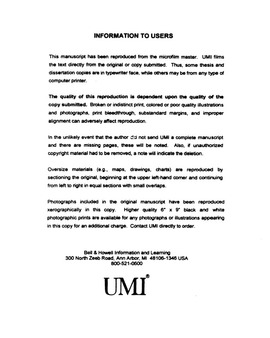| dc.contributor.advisor | Ragan, Sandra, | en_US |
| dc.contributor.author | Froemling, Kristin Kathryn. | en_US |
| dc.date.accessioned | 2013-08-16T12:30:55Z | |
| dc.date.available | 2013-08-16T12:30:55Z | |
| dc.date.issued | 2000 | en_US |
| dc.identifier.uri | https://hdl.handle.net/11244/5969 | |
| dc.description.abstract | A mixed method approach (including diaries, questionnaires, and critical incident scenario discussions) was utilized for data collection. Of the ten married couples who participated in the study, only four couples successfully completed all three methods. A case study approach was implemented to highlight the communication of the four couples. In the discussion section, the diary entries from the remaining six couples were included to provide further evidence for the existence of dialectical tensions, management strategies used to negotiate tensions, and commitment and trust in the marriages. | en_US |
| dc.description.abstract | Cross-sex friendships dramatically decrease in number and in perceived intimacy with age and marriage (Rose, 1985; Rubin, 1985). In U.S. society, social taboos treat the formation of cross-sex friendships as a logical progression toward a romantic relationship. At some point, couples must contend with cross-sex friendship conflicts. If marital couples are less likely to engage in cross-sex friendships, how do they communicate about their friends in a way that makes the friendship acceptable in their marriage? | en_US |
| dc.description.abstract | Four dialectical tensions were identified in the communication of the participating couples. Self-other orientation dialectic is an intrapersonal dialectic, which involves privileging one's own needs over the needs of the other. | en_US |
| dc.description.abstract | Of the management strategies used to negotiate dialectical tensions, selection was reported, but the couples were actually more likely to utilize segmentation to manage dialectical tensions. One couple reported implementing moderation in their own relationship, while none of the couples reported the use of reframing or disqualification. | en_US |
| dc.description.abstract | Spouse-friend temporality dialectic involves the amount of time spent with the spouse versus time spent with the cross-sex friend. Discuss-divert dialectic concerns whether to discuss with the spouse details of interactions with the cross-sex friend. The fourth dialectic is confront-avoid, which involves confronting a spouse regarding the nature of the cross-sex friendship. | en_US |
| dc.description.abstract | Regarding commitment and trust, couples indicated that honoring their commitment to their marriage was more important than maintaining cross-sex friendships. According to the participants, the key to dissipating jealousy and strengthening trust in the marriage was for the spouses to communicate their commitment to each other. | en_US |
| dc.format.extent | x, 204 leaves ; | en_US |
| dc.subject | Psychology, Social. | en_US |
| dc.subject | Sociology, Individual and Family Studies. | en_US |
| dc.subject | Speech Communication. | en_US |
| dc.subject | Friendship. | en_US |
| dc.subject | Man-woman relationships. | en_US |
| dc.subject | Spouses. | en_US |
| dc.title | Romantic partners' communication about their cross-sex friends: Dialectical tensions and management strategies. | en_US |
| dc.type | Thesis | en_US |
| dc.thesis.degree | Ph.D. | en_US |
| dc.thesis.degreeDiscipline | Department of Communication | en_US |
| dc.note | Source: Dissertation Abstracts International, Volume: 61-04, Section: A, page: 1221. | en_US |
| dc.note | Adviser: Sandra Ragan. | en_US |
| ou.identifier | (UMI)AAI9968106 | en_US |
| ou.group | College of Arts and Sciences::Department of Communication | |
